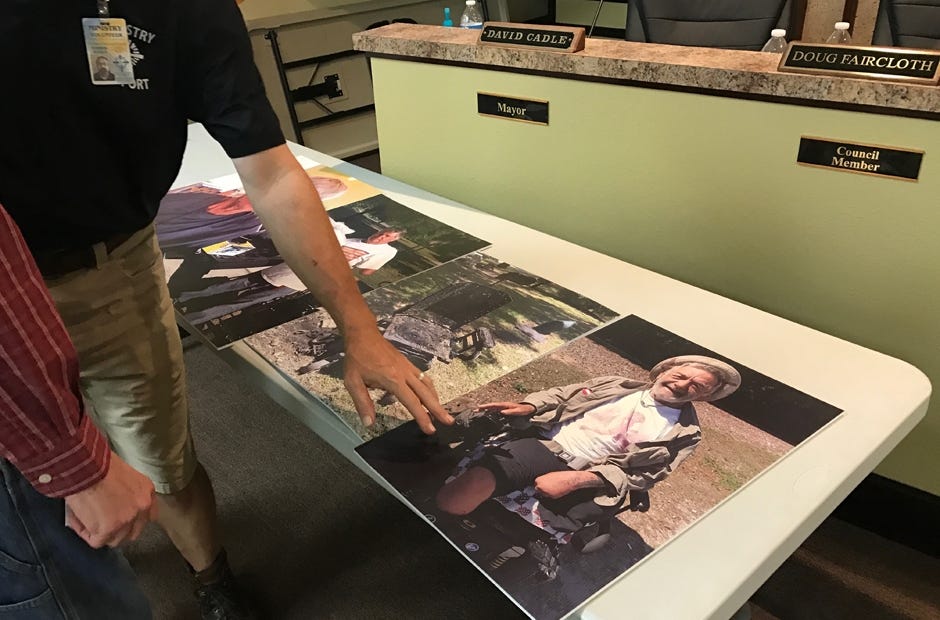![David Booher displays photos of homeless individuals he has worked with through church ministries. [MARK JUDSON/NEWS BULLETIN]](http://127.0.0.1/wordpress/wp-content/uploads/2022/01/ghows-DA-4b681f58-4d14-0f45-e053-0100007ff50b-3d0029e2.jpeg)
CRESTVIEW—In at least a half-dozen locations across Crestview, woods are the only home to dozens of people with nowhere else to go.
From victims of addiction, to sufferers of mental health conditions, to individuals experiencing unfortunate circumstances — trees provide protection from a world that has largely forgotten them.
OPENING THE CONVERSATION
Crestview lacks a central location for homeless individuals but various churches and groups across the city maintain soup kitchens or cold night shelters to provide aid.
“What I found was that a lot of these groups weren’t talking to each other,” Councilman J.B. Whitten said. “One group would be in need of something and not realize that this other group was able to help them. So, I wanted to open up that conversation.”
Whitten hosted a workshop Feb. 27 to start the process of opening communications. His passion for aiding the homeless began in the years before he was a council member; it focused on assisting veterans.
“I was working on helping homeless vets and I realized that there’s more than just vets that are homeless,” Whitten said. “I had to be educated on the situation and learn what resources are available and who people can call for help.”
People like those taking refuge in encampments. Police Chief Tony Taylor believes there to be a few dozen, but community activist David Booher said this number could exceed 100.
Booher voluntarily brings necessities to people living in the camps and offers them mentorship. He recognizes homelessness as a “community problem” and cites lack of proper medical and mental care as a reason for the poor quality of life many of those he helps have fallen into.
Booher identified six camps that exist in the area but declined to disclose their location for fear of harm brought to residents there. Harm like that which occurred last March, when two homeless individuals purportedly had their tent and possessions set ablaze.
HOUSING THE HOMELESS
Areas like Fort Walton Beach have created group housing projects to accommodate the homeless but Whitten says this isn’t the most feasible option.
“Homeless or no, people don’t want to live in a large space occupied with other people all the time,” he said.
Further, these locations only provide temporary arrangements — not permanent facilities. The cost of building subsidized housing or apartments for those individuals, such as seen in other areas, exceeds a city budget, he added.
This is where groups like the Crestview Area Shelter for the Homeless come in. The non-profit organization coordinates cold-night shelters, food kitchens and supply centers across Crestview with area churches’ help.
The group also runs a temporary, daytime shelter — Helping Hands — where folks can come in to use computers, wash clothes and apply for jobs.
Still, this presents the problem of getting to the various shelters. Moving across the city each day for the chance of a meal or bed isn’t the most feasible option for some, according to Whitten.
The city welcomed an effort to construct a homeless shelter a number of years ago using private grant money but the individual — unknown to Whitten — purportedly was eyeing a location near Twin Hills Park and the City Council at the time opposed the measure due to children’s presence in the park. The person purportedly proposed no secondary location and the effort failed.
WORKING TOGETHER FOR A SOLUTION
Food and shelter aren’t the homeless’ only needs. Some require assistance seeking veterans’ benefits, disability applications, bus tickets, detox information and many other personal and medical needs. CASH works to bring these resources to those in need.
These services are required by people such as one unnamed man, who Booher says has been Baker Acted 27 times but not provided with adequate medical assistance. The Florida Mental Health Act, commonly referred to as the Baker Act, allows for the involuntary mental health examination of individuals considered a threat to themselves or others. Law enforcement officials, judges or medical personnel can enact it.
“I don’t know what the solution is,” Whitten said. “That’s why I’m hoping the workshop and meetings that have followed it can be a springboard for communication.
“It’s not just my issue to figure out alone, it’s an opportunity for the community to work together to find what works best.”
THE ISSUE: Crestview's homeless have few resources available and must find alternative places to live.
LOCAL IMPACT: Individuals face low quality of life and the city runs risks for more individuals falling into similar situations without support systems. Aside from ethical dilemmas, these people are often forgotten.
HOW TO HELP
Contact Crestview Area Shelter for the Homeless, 398-5670, for more information on how to help. Donations of clothing, hygiene items, food, plastic totes or bags can be made from 11 a.m. to 4 p.m. on Mondays and 1 to 4 p.m. on Tuesdays, Wednesdays and Fridays at Helping Hands, 428 McLaughlin St.


This article originally appeared on Crestview News Bulletin: The dilemma: helping Crestview's homeless
